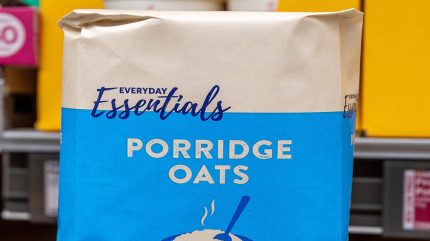
Budget supermarket chain Aldi UK has enhanced its sustainability by introducing paper packaging for its Everyday Essentials Porridge Oats product across all stores in the country.
The initiative ensures that the entire range of the supermarket’s porridge oat products, including Everyday Essentials, Organic, and Scottish Porridge Oats, is now devoid of plastic packaging.

Discover B2B Marketing That Performs
Combine business intelligence and editorial excellence to reach engaged professionals across 36 leading media platforms.
The move is expected to result in an annual reduction of approximately 57 tonnes (t) of plastic.
The transition to paper packaging is aligned with Aldi’s broader goal to cut its plastic packaging usage by 50% by 2025.
It builds upon the supermarket’s previous efforts such as adopting 100% recyclable cardboard packaging for all own-brand porridge pots last year.
Aldi UK plastics and packaging director Luke Emery said: “At Aldi, we are committed to reducing the use of plastic across our products and this latest change is another example of our ongoing progress.

US Tariffs are shifting - will you react or anticipate?
Don’t let policy changes catch you off guard. Stay proactive with real-time data and expert analysis.
By GlobalData“We know our customers want to make sustainable choices when they shop with us, which is why small steps like this can make a big difference.”
The introduction of paper packaging-based porridge oats follows the launch of the company’s own-brand Greyson’s London Dry Gin in paper packaging in May this year, reportedly marking it as the first supermarket to implement such a measure.
Last month, the retailer announced the trial of paper band alternatives to replace traditional plastic bags for select product lines, including its Nature’s Pick five-pack midi bananas and Organic six-pack bananas.
The success of this trial could lead to the elimination of roughly 234t of plastic packaging each year.





